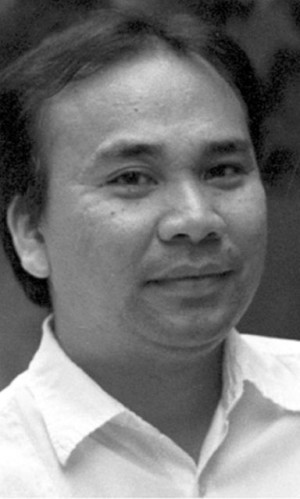
BERSALES
During my recent trip to Vietnam, I could not help but notice how things had changed since my last time there some eight years back. Spanking new cars had started to crowd out the voluminous horde of motorcycles on the streets amid parks and more parks.
At Quy Nhon City, capital of Bihn Dinh Province where I presented a paper at a conference on ceramics from recently discovered 15th-century kilns, I was even surprised that this city of just over 650,000 still had space for two Jollibee branches.
Any Filipino would have reason to be proud that a Filipino-owned company had set foot in this part of central Vietnam.
More surprises awaited us at our resort hotel (Quy Nhon has a long stretch of beige-colored powdery sand), where the snacks inside the refs in our room were either Jack and Jill or Oishi, produced by two rival Filipino companies.
(On an earlier trip to Penang, Malaysia and also in Singapore, huge Jack and Jill potato chips were all over the place.)
Who would have imagined that this would happen if one looks back three decades ago, when Vietnam had just emerged from a devastating war of independence and reunification?
Given its monolithic, socialist framework, the presence of so much capitalism and free enterprise would have been nothing more than pining for the moon if you were there in the 1970s.
Fast-forward to the present and virtually nothing is left of the original tenets of socialism except for the iron grip that the Communist Party of Vietnam holds on government, the military and the mass media together with its avowal to pursue a “socialist-led market economy” a buzz-word for what the party’s local counterparts in the Philippines would deride as nothing more than revisionism.
But look at what this revisionism has brought to Vietnam.
On the ground, what meets you on the streets are not grim-faced uniformed soldiers but green-clad security guards armed only with a baton.
Thousands of tourists flock to the markets of Ho Chi Minh City, formerly Saigon, the capital of the Republic of South Vietnam before it surrendered to the communists of the north in 1975.
At Da Nang, with its long stretches of white sand beaches unimpeded by resorts unlike Mactan Island where only resort guests know how the beaches look like, new five star hotels now lord over the other side of a new six-lane concrete highway.
Our own terminal at Mactan pales in comparison to its modern, Japanese-built terminal complete with double runways, thanks to the Americans who built so many airports all over South Vietnam in the 1960s.
Writ large, the presence of our favorite Filipino companies and the complete overhaul of the Vietnamese infrastructure would not have been possible if it had not been a member of the Association of Southeast Asian Nations (Asean).
Had it been declared a pariah for being a communist nation when it applied for membership in the 1980s, I wonder what Vietnam would have looked like. One need not look further than reclusive North Korea and imagine if Vietnam would have turned into one sans Asean.
Of course, it helps that Japan is pouring billions upon billions of yen into the Vietnamese economy, supplying its infrastructure needs and even carrying out much-needed archaeological excavations through tie-ups between Japanese universities and local research institutes.
(I could only wish we had the same outpouring of support for our own archaeological projects!)
On its 50th anniversary, despite its conservatism in confronting the great giant called China head on, Asean, is still without doubt relevant and will prove to be the single most important entity that will continue to bind the region, come hell or high water.
That it respects the integrity of every member nation and refuses to comment on internal affairs is what binds it together as it marches into the future.
Its most important project, shown by the presence of, for example, Filipino food products in Vietnam, is the creation of a single market, denominated by a single currency, regardless of location.
Already there is free movement of citizens of these member states (no visa is required to travel from one nation to the other) and with it, goods albeit brought home as homecoming gifts and souvenirs.
But the signals are already in the air and the economies of these member nations have already been given their deadlines to align with one another.
That it has survived where all other previous attempts at unity among diverse but neighboring nations had failed (e.g., SEATO and Maphilindo) is a testament to its relevance. Asean is here to stay.
* * *
Our limited edition, 260-page coffee table book, “Integracion/Internacion: The Urbanization of Cebu in the Archives of the Spanish Colonial Period” was launched yesterday at the Activity Center of Ayala Center Cebu.
Released on a limited print run, the book traces the development of Cebu, both province and city during the latter half of the Spanish period, replete with plans, maps and other documents from the National Archives of the Philippines as well as from the archives in Spain.
This book is also a catalogue of the materials from the NAP on Cebu that were exhibited at USC Museum in 2013-2014, which are now at the Museo Sugbo, the Cebu provincial museum.
If you are interested to buy a copy of this limited-print-run book, kindly call Tina Bernil at Tel. No. (032) 2300 100 loc. 290.
Some copies will also be at the USC Museum Shop and later at the museums shops of Casa Gorordo Museum, Cebu Archdiocesan Museum, Museo Sugbo and Museo Parian sa Sugbu/Jesuit House of 1730 as well as at the PhiloSophia Library Café.
Disclaimer: The comments uploaded on this site do not necessarily represent or reflect the views of management and owner of Cebudailynews. We reserve the right to exclude comments that we deem to be inconsistent with our editorial standards.




